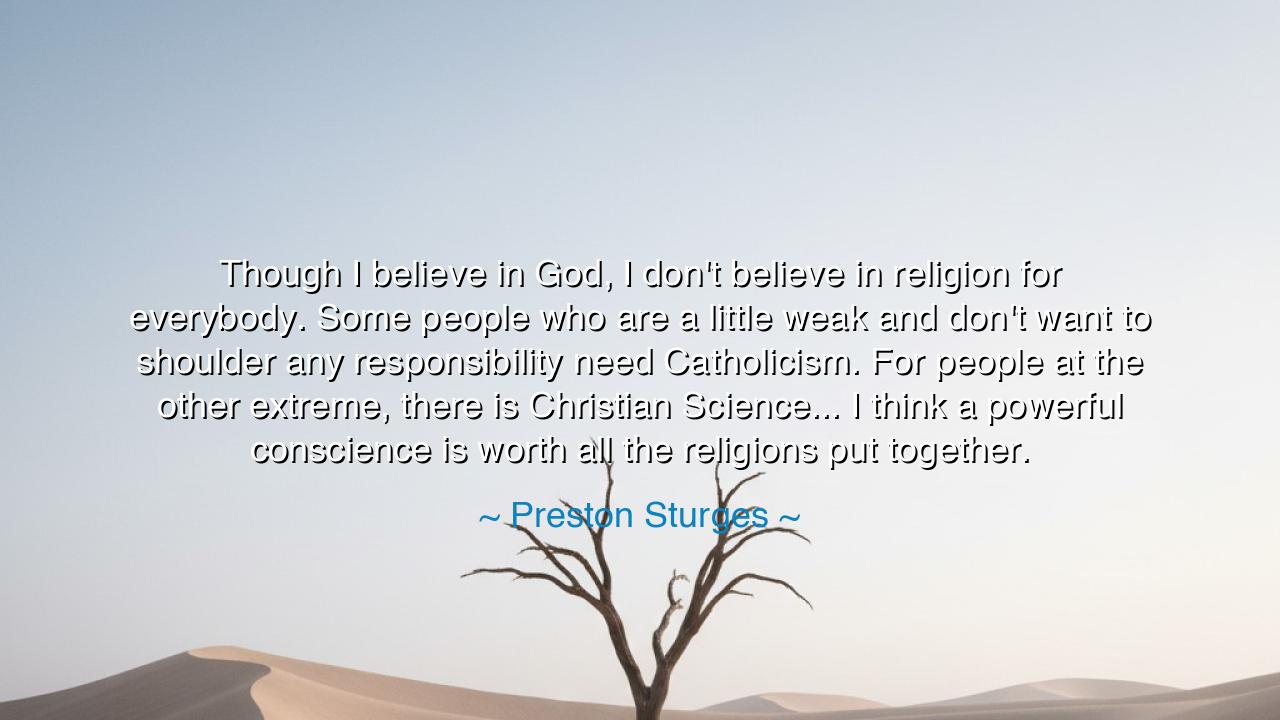
Though I believe in God, I don't believe in religion for
Though I believe in God, I don't believe in religion for everybody. Some people who are a little weak and don't want to shoulder any responsibility need Catholicism. For people at the other extreme, there is Christian Science... I think a powerful conscience is worth all the religions put together.






Preston Sturges, a man of wit and unflinching candor, declared: “Though I believe in God, I don’t believe in religion for everybody. Some people who are a little weak and don’t want to shoulder any responsibility need Catholicism. For people at the other extreme, there is Christian Science... I think a powerful conscience is worth all the religions put together.” In these words he speaks not to dismiss faith, but to call men back to their own inner authority, to the sacred fire of conscience which, once awakened, guides with a surer hand than any rulebook or ritual. For Sturges saw clearly: the highest temple is not built of stone, but within the soul.
The ancients knew this truth, though expressed in different forms. The oracle at Delphi proclaimed, “Know thyself,” for self-knowledge is the first step to moral clarity. The Stoics taught that virtue was not dependent upon the favor of gods, but upon the cultivation of reason and justice within. Even the prophets of Israel thundered that burnt offerings and sacrifices were worthless if the heart remained corrupt. Thus, Sturges’s words are not rebellion against the divine but a return to what is oldest and truest: that a powerful conscience is greater than blind obedience to forms.
Consider the story of Socrates, who stood before the tribunal of Athens accused of impiety and corruption of the youth. The city demanded his submission, but he refused to betray his conscience. He declared that he would obey the voice within, the divine whisper he called his “daimon,” even if it led to death. And so he drank the hemlock rather than compromise the truth he felt bound to. His example echoes Sturges’s conviction: that the inner conscience, once alive, is stronger than decrees, traditions, or fear of punishment.
Yet, O listener, we must not scorn those who need the guidance of organized faith. For some, religion offers structure where there is chaos, comfort where there is despair. The peasant who kneels in the cathedral may find strength he cannot summon alone. The believer who clings to ritual may find peace in the rhythm of prayer. Sturges himself acknowledged this, noting that religion can serve those who feel weak or overwhelmed. But he also warned that such dependence can become a crutch, leaving men unwilling to shoulder the full weight of their own responsibility.
History teaches us this balance. Think of George Washington, who though respectful of religion, spoke often of conscience as the true guide of citizens. In his farewell address, he urged that morality was the foundation of freedom, and that no nation could endure without it. For it is possible to be devout yet corrupt, pious yet cruel. What saves a man in the end is not the label of his creed, but the power of his conscience to choose justice, truth, and compassion.
The lesson is clear: do not despise religion, but do not depend on it blindly. Do not imagine that a creed, however noble, can replace the voice within that tells you when you have done right or wrong. Cultivate your conscience as you would a garden—through reflection, honesty, and courage. If you believe in God, let that belief make your conscience stronger; if you doubt, let your search for truth sharpen it still. For in the end, it is the inner compass, not the outer ritual, that determines the worth of your soul.
Practical wisdom flows from this: each day, test your actions against your conscience. Ask yourself not merely, “Is this permitted by my tradition?” but “Does this serve truth, does this honor life, does this strengthen love?” If your conscience condemns you, seek to amend; if it approves, walk forward with courage. Build your character so strong that no authority, no crowd, no tradition can sway you from what is right.
So remember this, O children of tomorrow: a powerful conscience is worth all the religions put together. Respect the paths others walk, but do not neglect the inner light that shines within your own breast. For churches may crumble, doctrines may fade, but conscience endures as the eternal voice of God within the human heart. Listen to it, honor it, and you shall walk the path of wisdom, whether in temple, desert, or silence.






AAdministratorAdministrator
Welcome, honored guests. Please leave a comment, we will respond soon